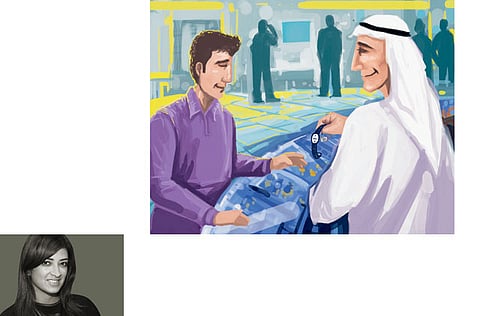Employment conundrum
Educational institutes and media need to change prejudice towards trades and skilled jobs

About a month ago I was in a London cab on my way to an antique market. For most of the journey, I was obliged to listen to a talk show, blaring loudly from the speakers, the driver seemingly unaware of just how loud it was.
The topic of discussion was unemployment, and specifically the lack of ‘decent' jobs readily available to British citizens. Apparently, and to my surprise, jobs were available though people consciously chose not to take them. This sounded all too familiar and quite intriguing.
In the UAE there are readily available skilled jobs — from carpenters and electricians to chefs, waiters, florists and construction workers. As I continued to listen, now attentively, I learnt that the UK has many jobs of this nature unfilled by its own jobless citizens.
‘Menial' was the word used to describe them; another coincidence?
When faced with persistent unemployment and low to no income, surely any legitimate job is worth having; apparently not. The UK's jobless are not only declining opportunities on the basis of the task at hand, but also if the location is not to their liking. It begs the question, who exactly is taking up the abundance of ‘menial' jobs? In the UK, apparently migrant workers from eastern Europe, Russia and the Philippines. We see a similar effect in the UAE, the majority hailing from India, Pakistan and, similarly, the Philippines.
It is ironic that unemployment is regarded as a persistent problem when quite simply expatriates occupy much of certain segments of the workforce. This is the heart of the issue, and with 43,000 unemployed Emirati citizens, there can be tremendous social and economic gains by making some common sense changes to our labour force.
Winds of change
The demographic disparity is crystal clear — Emiratis are a minority of the labour force. In addition, the private sector continues to find it difficult to attract, employ and retain citizens as many Emiratis are enticed by government jobs, which pay more and have shorter working hours.
To its credit, the UAE has worked on areas such as vocational training. With organisations such as the Sharjah Institute of Technology, Abu Dhabi Education, Vocational Training Institute and twofour54 tadreeb, a lot of service sector training is available to Emiratis. These programmes are relatively small however, and the greater issue remains society's lack of enthusiasm or, in some cases, distaste towards trades and skilled jobs, which influences Emiratis accepting, or rather rejecting, such jobs.
I recently heard of a young Emirati working as a salesperson in a department store. He truly enjoyed his job — however his only concern was that other nationals who walked in mocked him.
Pride and vision in what one does to earn an income is important. I believe that a carpenter today, for instance, could just as well grow a thriving furniture business. Looking through the history of the UAE in the 1950s, you will find that many of the successful businessmen of today started off in skilled jobs that they took pride in.
I believe the answer is to be found with support from education and media sectors. Firstly, it ought to start at the school level. Naturally, some students are less academically inclined and perhaps more successful with a physical skill. By cultivating and instilling a sense of pride in their skills, students may be subsequently guided towards more appropriate options after school. Promoting the importance of such skills and highlighting their relevance to society will certainly boost self-confidence and act as a catalyst for the acceptance of certain jobs. Second, the media can play a huge role in shifting attitudes towards the paradigm of skill-based jobs. Of note was the recently aired television campaign This is Dubai, which interviewed people of different ethnicities living and working in the UAE.
Not only did it demonstrate the hard work of the people who had given back to the country, it also exhibited their pride. For a better tomorrow, showcasing Emiratis in skill-based jobs through similar campaigns and highlighting their satisfaction through achievement is crucial.
We must move beyond social prejudices towards Emiratis adopting skill-based ‘menial' jobs and increase awareness about the importance of integrating nationals into every sector of our economy. Not only will it help create balanced and sustainable economic development, but it will also elevate the dignity and self-respect of every citizen.
Muna Al Gurg is a director at the Easa Saleh Al Gurg Group and chairwoman of the Young Arab Leaders.



